09
Dec 2020The Planet Doesn’t Have Time
I always keep an eye open for interesting English on t-shirts and other types of clothing. Waiting in line at the office elevator this morning, I noticed this message on a guy’s jacket:

It reads:
THE PLANET DOESN’T HAVE
TIME FOR THIS
This message felt so appropriate, during the time of COVID, during a time of ongoing environmental crisis, during a time I am unusually busy at work, waiting in line for an elevator. And it’s Christmastime, too.
Notice that everyone is wearing masks. We had a mini scare two weeks ago at the Pudong International Airport which resulted in more mask wearing again, plus now that it’s winter, people really don’t mind the masks (it helps keep your face warm).
Otherwise, life in Shanghai is pretty normal.
02
Dec 2020Editing MADNESS
Yes, that title is a Ren & Stimpy “Space Madness” reference:
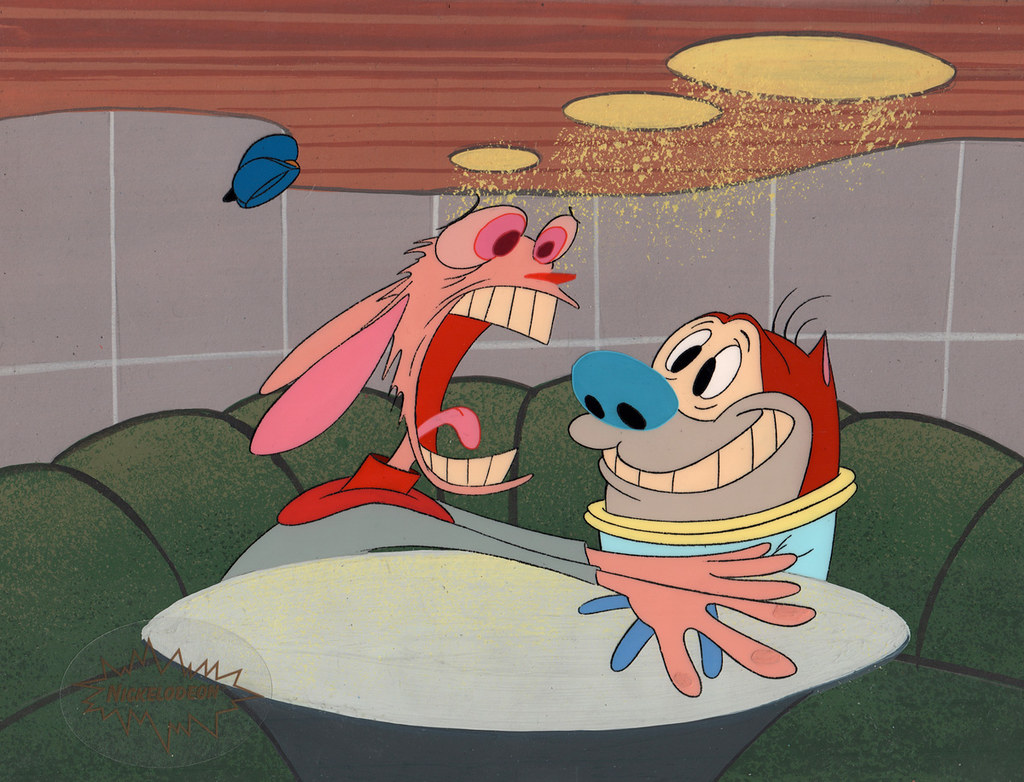
(I’m proudly showing my age.)
So for the latter half of November and the beginning of December, my staff and I are doing a ton of editing, covering all 165 B2 (Upper Intermediate) grammar points (that number still may change) on the Chinese Grammar Wiki. If you’ve ever noticed that some of those grammar points need a little editing, I suggest you take another look. And yes, this book is finally coming!

I actually have a number of blog posts I’ve been meaning to write, but I guess that can wait until I get some more books out…
A new Level 2 Mandarin Companion title is coming as well.
And the You Can Learn Chinese podcasts continue, unabated…
Oh yeah, also doing this winter promotion thing for online Chinese lessons.
Busy, busy.
OK, back to editing!
20
Nov 2020Tone of Voice in Chinese Sentences
Understanding and conveying the proper tone of voice in a Chinese sentence isn’t easy. Some languages (Japanese comes to mind) allow you to “codify” levels of politeness or formality directly into the verbs themselves. Or there are super formulaic sentence patterns for certain levels of politeness. Even in English it’s somewhat formulaic (“Please,” “Can you…?”, “Could you…?”), but less so in Chinese.
I remember talking to an AllSet Learning client years ago about this very issue years ago. She was a mother trying to raise polite children, so of course she taught them to use the word “please” for requests, which in Chinese is 请 (qǐng). So she wanted her kids to use 请 (qǐng) for their Chinese language requests. Seems simple, right? Actually, it’s not at all, because while sometimes “please” can be translated directly to 请 in a straightforward way, in many cases it’s just plain awkward in Chinese, and even super polite people just wouldn’t use the word. To be natural in Chinese, you need a much more nuanced understanding of what polite speech in Mandarin is. And that takes time.
I really enjoyed editing the example sentences for Softening the tone of questions with “ne” on the Chinese Grammar Wiki. (We’re getting ready to release the third volume: B2 / Upper Intermediate.) Here’s a sample:

I’m curious if any readers out there have come across any books, textbooks, resources, etc. that are especially good at helping learners understand tone of voice in Chinese. It seems to me that it’s quite an underserved facet of the journey.
Oh, and for Upper Intermediate fans of the Chinese Grammar Wiki, at AllSet we’re currently working through every single B2 grammar point (we’re almost done with the “Parts of Speech” section of the big B2 grammar point list), editing sentences, adding/fixing pinyin, improving translations, removing “stub” tags, and even rearranging entire articles and reworking explanations. If you have requests or suggestions, now is a good time!
17
Nov 2020Catholic Mass in Shanghai in the Time of COVID (2020)
I’m often asked about the COVID situation in Shanghai. The truth is, things are almost normal now. We do have to wear face masks on the subway and in places like hospitals. But other than that, things are pretty normal.
There is one notable exception, though. English Church services for foreigners have still not been allowed to resume, even though church services in Chinese resumed months ago. (I assume it’s the same for Catholics as for other Christians, but I’ll correct this if I’m wrong.)
I hear a lot of foreigners assuming that this is the government taking the opportunity to “tighten its grip” on religion, and that’s certainly possible, but I’m not so quick to assume malicious intent. I think it’s just way easier for the government to control the situation when there are no foreigners or foreign languages involved, and it just doesn’t want the hassle. (Nor does it place great value or priority on any kind of freedom of religion, however.)
Anyway, I took some photos last Sunday at the Xujiahui cathedral, St. Ignatius. You have to sign in at the gate, fill out a form, and display your health QR code to get in. (The “pass” they give you is good for a month, so you don’t have to fill out the form every week.)

There’s also social distancing going on, marked with smiley face stickers instead of X’s:

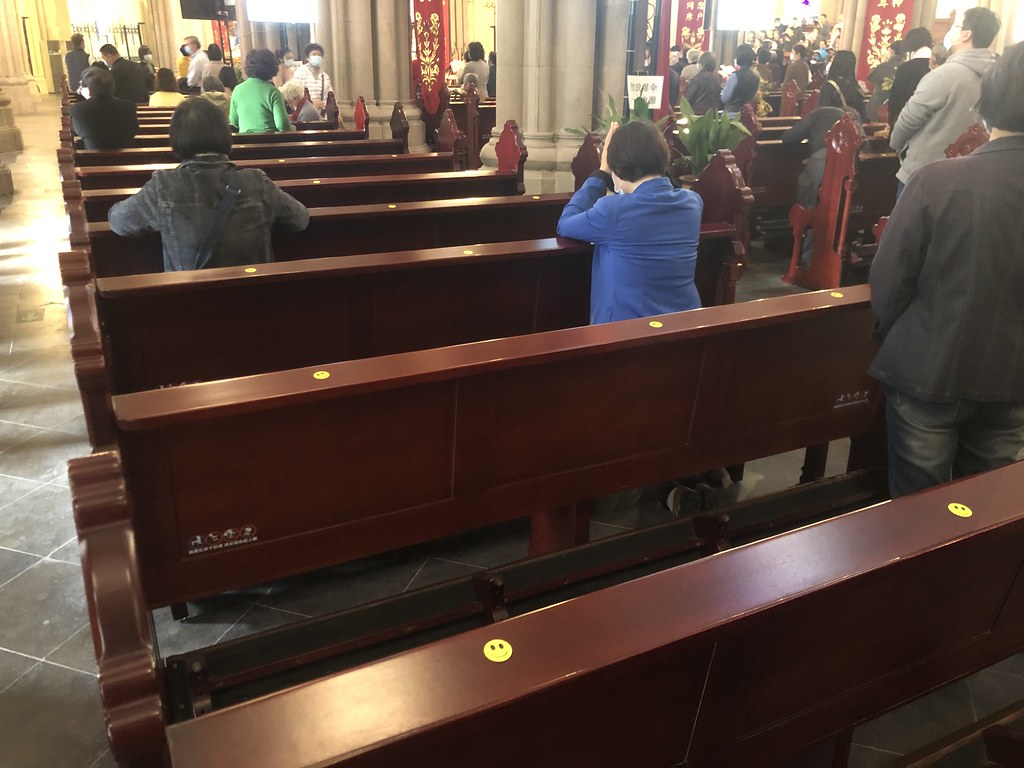

Somewhat surprisingly, Communion is distributed at mass.
Life goes on…
2021 Update: English services resumed May 15, 2021.
11
Nov 2020G-Hub High-pi
I’m pretty sure I’m the only one that actually took a close look at this sign, but there’s a lot going on here:

It reads:
G-Hub 欧洲啤酒节
一起来HIGH啤
Here’s what’s happening:
- G-Hub for “German Hub”? OK…
- Beer bubbles for the 氵 water component in 洲 and 酒
- In the character 啤, the word “BEER” replaces the mouth component 口
- Sudsy tops of characters and ice cubes or cheese cubes (??) inside 酒 (I want it to be cheese cubes, but I’m pretty sure it’s supposed to be ice cubes, sadly)
- The pun “HIGH啤“ which sounds like “happy” and uses the word “high” in the Chinese way to mean “excited and happy” plus the character 啤 from 啤酒
03
Nov 2020Last Vote from Florida
I was able to mail my absentee ballot in through the Shanghai Consulate via diplomatic pouch at the end of September, and then confirm last week through the Hillsborough County Supervisor of Elections’ website that it was received and counted. Whoo-hoo! (Much better than my 2016 “vote by fax” experience!)
I feel a lot of pressure as a Florida voter (key word: 摇摆州, literally, “swing state”), and this is actually the last election I’ll be voting as a Floridian. My mom is moving to Atlanta, so that will be my new address I’ll be using in the U.S.
Americans, please get out there and VOTE VOTE VOTE!
28
Oct 2020Ad or Vocab List?
I was kind of amused by how much this ad comes across as a vocab list:

Here is that vocab list:
- 坐公交 (zuò gōngjiāo) to take public transportation
Note: this usually means a public bus - 乘地铁 (chéng dìtiě) to ride the subway
Note: the verb 坐 is also fine - 骑单车 (qí dānchē) to ride a (single-gear) bicycle
Note: nowadays this word often refers to a bike-sharing service - 买火车票 (mǎi huǒchēpiào) to buy train tickets
- 打车 (dǎchē) to call a car (taxi or ride-sharing service)
Note: because of the rise of ride-sharing services in general (and Didi in particular), the word 打的 is far less common these days, most people using 打车 or 叫车
The point of this ad is that no matter what form of transportation you choose, all can be accomplished within AliPay (支付宝).
22
Oct 2020Meatland
I saw this ad in the Shanghai subway. I’ve also seen an animated version before movies in the movie theater. I find this “land of meat” a bit disturbing…

(Americans consume too much meat, but the Chinese consuming more and more meat is not good for anyone either, much less the planet.)
The brand is called 双汇 (Shuanghui) and is a big brand you’ll find in any Chinese supermarket.
20
Oct 2020Bubble Houses in Shanghai’s Space Forest
My family and I stayed in one of these places during the October holiday. The Chinese name for these kinds of structures is 泡泡屋, literally “bubble house.”


You’re inside a giant plastic bubble, inflated by a pump. So there’s a sort of “airlock” door. Interestingly, while you can easily see the bubble walls inside the bubble, they often don’t show up in pictures. (In the photo below, you can see the shiny plastic wall in the bottom left of the photo.)


This place is located out in Chongming Island, technically part of the Shanghai Municipality, but a two-hour drive from the city center. There’s not a whole lot to do out there, but “Space Forest” knows how to create a pretty cool atmosphere in the woods, especially at night.



Knowing that there’s not a whole lot to do, Space Forest provides bikes to ride, and there are ATV rentals as well. It’s a kid-friendly place. You’re also allowed to bring dogs, which was a big plus for us.
So you’re basically paying for the novelty, and I’m not sure I’d want to stay for more than one night unless I was really looking for a place with few distractions (there are no TVs in the rooms, and no WiFi).
They bubble houses look cool, though! I think I enjoyed this place more than glamping, for the novelty of it.
16
Oct 2020Glamping in Shanghai
I’ve been meaning to go “camping” in Shanghai for a while, knowing that whatever activity I engaged in would probably be pretty different from what I know as “camping” in the USA. Well, on the October holiday, I finally did it… my first glamping experience. (And yes, they even call it “glamping” here in Shanghai, too… 精致露营 in Chinese.)

The campgrounds are located within a large park on Changxing Island 长兴岛 (near Chongming Island 崇明岛) called 长兴岛郊野公园 (Changxing Dao Jiaye Gongyuan). You pay for a park ticket (and dogs can get in too, if you buy their tickets), and then you can pay additional fees to rent out a tent for a night (complete with air mattresses), or for a space to pitch your own tent. (Guess which option most people choose?)

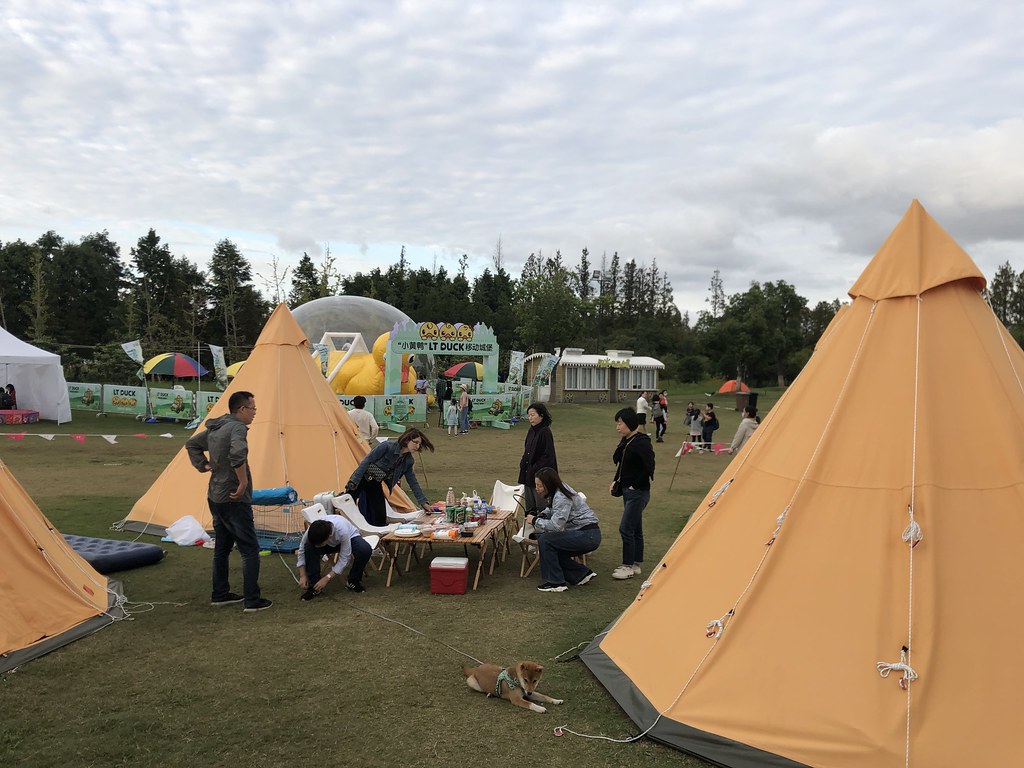

You can basically rent or buy anything camping related you might want: pre-lit hibachis to do your cooking, kebabs of food ready to grill, a cookout set that you set up yourself, picnic tables and chairs, etc.

I’m pretty sure no open fires were allowed, but there was a public bonfire lit by the park employees at night.

As expected, there weren’t many “experienced campers” there. I overheard one lady who was shocked to discover that there were no showers at the park.
During the day, you see a lot of tents in non-camping areas of the park. In China tents are often used as shelter from the sun during a relaxing day in a park, rather than shelter from the elements for sleeping in at night.

All in all, it was enjoyable. It just wasn’t the “camping” that I know.
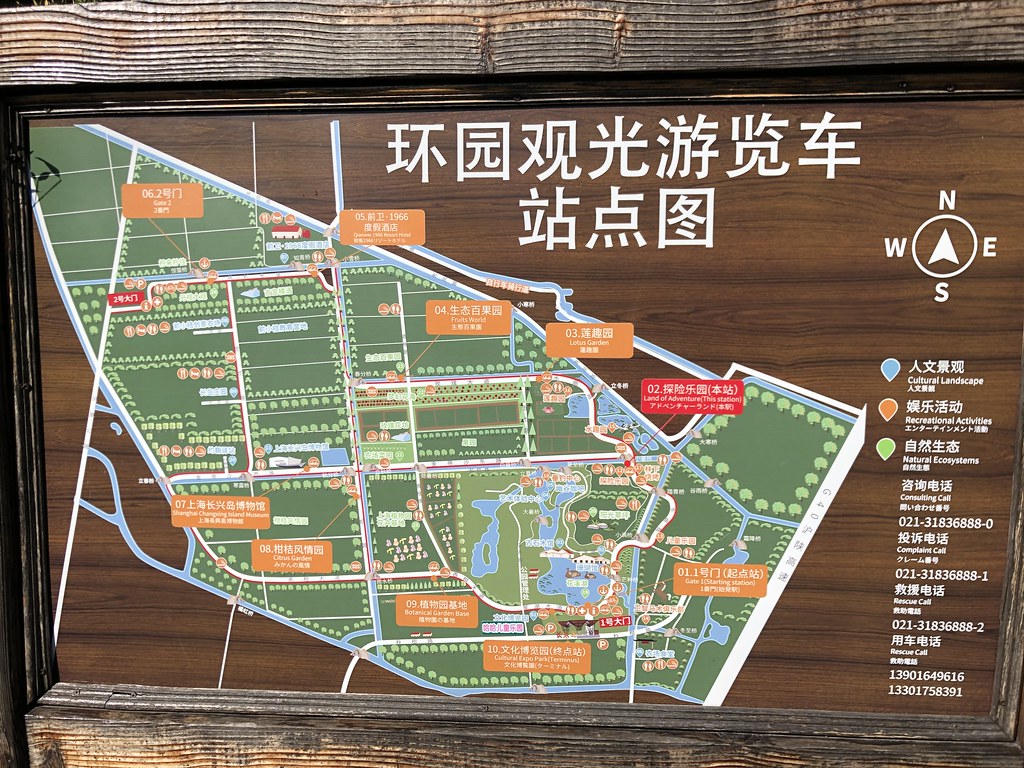
See also: Bubble Houses in Shanghai’s Space Forest
13
Oct 2020Known Rivers by Aaliyah Bilal
My friend Aaliyah has created a video series called Known Rivers about the experiences of Black people in China throughout history. It’s created for a Chinese audience, but there are English subtitles. Check it out! Good original stuff.
- Known Rivers 河流 Episode 1: Agatha and Eugene Chen “Origins”
- Known Rivers 河流 Episode 2: Agatha and Eugene Chen “Love, Marriage and Revolution”
- Known Rivers 河流 Episode 3: Langston Hughes “St. Petersburg to Shanghai”
- Known Rivers 河流 Episode 4: Langston Hughes “Jazz in Shanghai”
- Known Rivers 河流 Episode 5: Black People in Ancient China “The Kunlun”
- Known Rivers 河流 Episode 6: Black People in Ancient China “Zheng He’s Westward Voyage”
I first met Aaliyah not long after she first came to China, and her Chinese has improved a lot! From an educator’s perspective, this is a great example of a learner getting to a level where she can use her Chinese to do something interesting and creative to connect with a Chinese audience.
“Known Rivers” is a reference to the poem by Langston Hughes.
09
Oct 2020Goodbye, Wilson
I haven’t been writing anything over the Chinese October holiday. I’ve been coping with the loss of my friend Wilson.
It’s hard to believe that Wilson lived in China for only a little over a year, from 2002-2003, because his friendship meant so much and had such an impact on my own development. It wasn’t that he taught me any specific thing or gave me career advice (besides starting this blog). But his passion and his confidence were infectious, and they affected me. They affect me still. I think he is part of the reason that I’m still in China after all these years, running my own businesses, even though he left long ago.
I came across this very accurate quote about Wilson from my 2003 post:
While it’s true that some people come and go in our lives, sometimes you just know when friends have become permanent.

Until we meet again, bro.
29
Sep 2020How NOT to Learn Vocabulary
I’ve been meaning to write a longer blog post on this topic for a while, a sort of distillation of common mistakes witnessed over the years. Because it can be hard to find time for a proper long-form blog post, I figured I should probably just start with a simple list and expand on it later.

So, here you have it: common mistakes you want to avoid while learning vocabulary:
- Don’t add lots of “kind of interesting” words to your flashcards. You know the ones I mean… the “maybe I’ll use this someday” variety. These add up, and they will choke your vocabulary review sessions. Stick to what’s immediately useful: the words you can use in your speech immediately, or the words you frequently come across when reading but keep forgetting.
- Don’t neglect practice. Vocabulary review is a good thing, but if all you’re doing is keeping a whole bunch of words in a “sort of familiar” state which doesn’t quite make it to the “I can use this word the next time I need it” state, what are you really doing? Are you collecting, or are you trying to get fluent? Value your vocabulary.
- Don’t study new words in isolation; study new words in collocations and sentences (especially if you’re studying on your own). This is not just because sentences give you a clue as to how a word is used. It also gives you a clue as to how useful a word is. If a word is sort of “iffy” already, by looking at the collocations and example sentences, you should be able to spot red flags (hey, all these sentences are super formal!) or spot the most useful ways a word can be used (hey, this is exactly the object I want to use this verb for!).
- Don’t study big long lists all at once. This is one thing that I think both learners and teachers struggle with, but if you try to tackle too many words at once, none of them are going to stick very well. This isn’t to say that vocabulary lists are useless. The point here is that you’re better off picking 3-5 words from a longer list and really getting a handle on those first, rather than covering 10 and forgetting them all the next day.
- Don’t study new similar words at the same time. Studying the difference between similar words is a big part of mastering any language, especially when you get to the intermediate stage or beyond. But you’re not doing yourself any favors by simultaneously trying to learn two or more words with the same English meaning and slightly different uses in the target language. You’ll just get confused. The better way is to choose just the one you most need first, and master it as it is used by native speakers. Later, learn another one of those similar words and master it as it is used naturally too. After you’ve got familiarity and working knowledge with both words, you’ll naturally start wondering what the difference in usage between the two words is (if your brain hasn’t sort of worked it out on your own already). This is the right time to address that.
These aren’t the only things NOT to do, of course, but I see these as the big ones that come up again and again. (See also: More Effort Means More Learning.)
An important concept here is ROI (return on investment): What will get me the best results for the time I invest studying and practicing?
23
Sep 2020Cucumber Snakes and Tofu Boxes
These days I often default to the same foods I habitually consume, so it’s easy to forget the rich variety that’s out there in restaurants of Shanghai. These two dishes are not super crazy or anything; they were on the menu at a mid-tier restaurant at a mall in Shanghai. They were just kind of fun for an ordinary roast duck restaurant.
Cucumber Snake
If this cucumber dish doesn’t look especially like a snake to you, let me assure you it does when the server picks up the cucumber by the “head” with tongs, holds it up in the air over the plate, and then proceeds to cut it into short chunks with a pair of kitchen scissors. (Sorry, I didn’t capture that part.)

Tofu Boxes
OK, I have to admit… this one was super disappointing. The tofu, while not stinky, was just very bland, and the meat sauce and shrimp inside the “boxes” did little to change that. I like the concept, though!

I need to remember to get out to new places more and enjoy the show…
15
Sep 2020Punning Pronouns for Finance
I’ve been seeing these ads in Shanghai recently:

The key line is this one:
财富在这「理」
Here you have a pun on the word 这里 (“here”), substituting 理 for 里. They sound very similar.

So the punned sentence sounds like it’s saying “wealth is here” (a basic 在 sentence), but if you read the characters, it’s saying, “wealth is managed here,” using 在 to specify location. This is because 理 can mean “manage,” as in the phrase “理财” (“to manage wealth,” or “wealth management”).
But here’s another thing you might not know: in informal Chinese, 这 can stand in for 这里 or 这儿. (Same for 那 and 那里/那儿, but not so much 哪.)

That’s sort of an intermediate grammar point, and not super common. If you’re still working on basic question words, be sure to check out the Chinese Grammar Wiki’s article: Placement of Question Words.
11
Sep 2020Why do the Chinese hate Disney’s Mulan so much?
Disney’s Mulan comes out in China today. All indications are that this movie is going to be a huge flop in China.
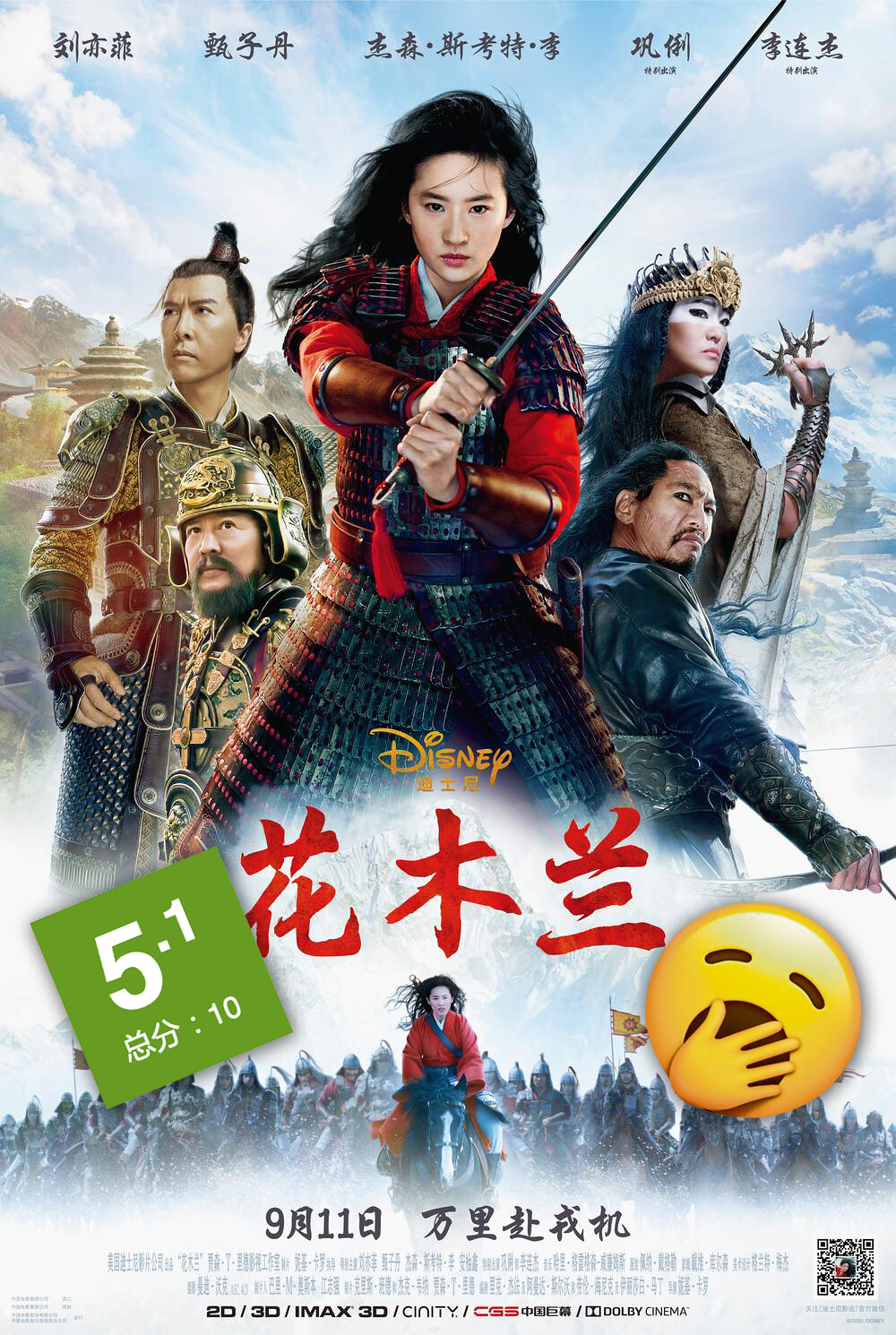
Now, Mulan isn’t getting great reviews in the US either (it’s currently at a 5.5 out of 10 on IMDb), but it’s doing even worse in China (currently at a 5.1 out of 10 on MTime, China’s IMDb). Some of the US reviewers are saying that the film suffered from trying to appease Chinese censors and Chinese audiences.
But Chinese audiences are not at all impressed with the results, and I’m talking about the buzz before anyone has ever seen the movie. Chinese audiences love Disney movies. Chinese audiences also loved Kung Fu Panda, so it’s not simply a “don’t try to do our culture” reaction. So why all the hate for Mulan in China?
I’ve been asking lots of Chinese friends what they think about Mulan. Everyone hates it (without having seen it), and the reasons are various:
- The kung fu choreography is terrible.
- The plot is poorly written. (Not sure how they can know this before it’s released?)
- Disney arbitrarily changed key, immutable “facts” about the legend of Mulan, who is from Henan, not Fujian.
- It doesn’t “feel” like a Chinese movie; the stylistic choices made don’t have a Chinese sensibility and don’t appeal to Chinese audiences.
- The cartoon version was better.
One Chinese friend agreed that the American creativity showcased in a movie like Kung Fu Panda goes over way better with Chinese audiences because it’s brand new, rather than co-opting “sacred” Chinese tradition.
I can’t help but wonder if the current political situation doesn’t impart a bit of negative energy to an American film release in China. (It certainly doesn’t help!) But clearly, this movie has been a huge, expensive fail for Disney.
I’m just glad that I can go to the movies in Shanghai again, finally. Going to see Tenet this Saturday! (Chinese friends say this one is good.)
Update: SupChina had the same idea, and wrote a much more informative piece on this topic, published the same day! Check it out: Why Chinese viewers hate Disney’s ‘Mulan’
08
Sep 2020Fake Lu Xun Quotes on a Truck
So I was strolling down the street in Shanghai, and passed this big crane truck parked on the sidewalk:

Then also noticed that it had this “Lu Xun quote” on it (which is kinda unusual for a truck):

In Chinese text, that would be:
原本是可以赚钱的后来做的人多了,也就不赚钱了慢慢的变成为人民服务了。
*鲁迅 (not really)
In English, that would be:
Originally it made money, but then too many people started doing it. It slowly changed from making money to serving the people.
Pretty unusual quote for the side of a truck, right? Some kind of weird brag about service attitude and not caring about money?
Well, that’s not really a real Lu Xun quote. There’s a similar Lu Xun quote that goes like this:
希望是本无所谓有,无所谓无的。这正如地上的路;其实地上本没有路,走的人多了,也便成了路。
Translated to English (and somewhat simplified):
Hope is like a path in the countryside. Originally, there is nothing, but as people walk this way again and again, a path appears.
Lu Xun
Oh, and also the quote on the truck uses “de” wrong (“慢慢的” should be the adverbial “慢慢地”).
Yeah, Shanghai has some mean streets… fake Lu Xun quotes and bad grammar, right there on the sidewalk. Look out!
03
Sep 2020The Ever-Present Phantom Menace
It doesn’t matter how long you’ve been in China. There is a phantom menace always lurking. Yes, I’m talking about food poisoning. It got me on Tuesday. Yikes.

After a rough morning, I went into “recovery mode” and slept all day.
There’s a lot I’d like to write about. First step: stop getting sick!
26
Aug 202020 Years
So as of August 20th (last week), I’ve been living in China for 20 years. Twenty years!
It’s not an accomplishment in itself, but it does feel like something of a milestone. As someone who likes to impart meaning to certain events like this, I’ve been struggling with this idea: what does it mean?
Well, at the end of the day, it means I’ve been in China for 20 years. That’s pretty much it. Yes, I’ve had time to do some stuff here… learn some Chinese, earn a degree, get married, start a company, have a few kids… In theory I could have done all that in less than 10 years, though.

I was originally thinking that I might have a party or celebration of some kind. This has not been the best year for parties, but even so, things are normal enough in August that I could. The thing is, most of the friends I’ve made in China are no longer here, or at least no longer in Shanghai.
Part of me wants to just kick the can forward to 22 years, because at that point, I will have spent half my life here in China. But even so, the same questions remain.
I do have one answer, though: No, I am not manually updating the “years in China” count on my homepage. It’s a PHP script. (Mouse over the number for a thrilling surprise!)
18
Aug 2020Under-appreciated Undershirts
I will have been in China for 20 years this week. And yet, I still bump into little cultural differences that take me by surprise.
Case in point: the humble undershirt.

Fairly normal way to dress, right? But I get asked on an almost daily basis during the summer why I would wear two shirts. “Isn’t it hot?”
I never really noticed until now, but wearing an undershirt to absorb a little sweat is not really a thing here. (Big old sweatstains are, however, most definitely a summer thing here!)
